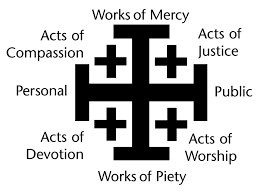 |
| Thanks to Clark Atkins, Bob (John Wesley Bobble-head) traveled with us on the Wesley Pilgrimage through England last month. |
The General Rules
First: By doing no harm, by avoiding evil of every kind…
Secondly: By doing good; by being in every kind merciful after their power; as they have opportunity, doing good of every possible sort, and, as far as possible, to all…
Thirdly: By attending upon all the ordinances of God; such are: The public worship of God; The ministry of the Word, either read or expounded; The Supper of the Lord; Family and private prayer; Searching the Scriptures; Fasting or abstinence.
These are the General Rules of our societies; all of which we are taught of God to observe. The Book of Discipline of The United Methodist Church“Maybe I should just go to the Lutheran Church!” This from the leader of a particular tiny church I once served. Jon was offended that our bishop, and The United Methodist Church in general, would find it appropriate to support collective bargaining. And, he wasn’t pleased that I supported the bishop.
“Maybe you should.” No, I didn’t say it, but I thought it. I actually didn’t say much at all; I was so taken aback by the fierceness of his anger. Still, I explained calmly that this was part of our denomination’s social principals. I don't think he heard me. Jon didn’t seem ready to hear anything outside his own perspective. And I didn’t have the tools then to speak out – to tell him the truth in love.
Jon had voiced more than once that “they” should just pull themselves up by their own bootstraps, like he had. No one had ever given him a handout! This man had attended a Methodist Church all his life, but he wasn’t Methodist.
Methodists are people who make it a point not only to attend church as regularly as they can for worship, but also to
At least that’s how we Methodists see it, if we’re really Methodists.
I was floored during my first United Methodist History class in seminary to learn how much this movement grew, and how much it shaped people’s lives, and even nations. AND, that it was only when attendance in societies became optional that the Methodist Church’s momentum began to slow.
It makes a case for small groups where we give our account – holding the others, and being held, in turn, to a higher standard – wouldn’t you say?
Methodists are people who make it a point not only to attend church as regularly as they can for worship, but also to
- Study their bible, pray, and actively work to grow spiritually
- Practice compassion in their day-to-day, through their words and actions; and
- Notice the injustices around them and work actively to alleviate what they can of it.
At least that’s how we Methodists see it, if we’re really Methodists.
Charles and John Wesley, and other leaders of the early Methodist movement realized that the church of their time and place (a.k.a. The Church of England in the 1700s) wasn’t equipping and empowering people to work toward holiness. And they believed strongly that people needed the tools and the practice. That’s how the Methodist movement began.
It was an add-on to what people were already doing. They were going to church, but they felt (rightly, imho) that this wasn’t enough. They needed help.
It was an add-on to what people were already doing. They were going to church, but they felt (rightly, imho) that this wasn’t enough. They needed help.
Enter the leaders of the Methodist movement. Some of them had been meeting weekly as what we now call the Holiness Club. They would listen to, challenge, and support each other as each gave an account of how they were daily living out their faith – hence, the word “accountability”.
When some others approached John Wesley for help with their own faith walk, he provided the General Rules (which I’ve referenced here, here, and here) for those attending class (small group) meetings. There is only one condition for those who desire entrance into these societies: "a desire to flee from the wrath to come, and to be saved from their sins. (Yeah, this language doesn’t exactly work for me either. Still, this was nearly 300 years ago. Times change.)
Any person who wanted to continue attending one of these groups was expected to observe three areas of weekly discipline: Doing no harm by avoiding all evil; Doing good towards others; and Attending all the means of grace (worship, communion, prayer, scriptures, fasting). And they did, in amazing numbers.
 |
| More about this particular Jerusalem cross another day. |
It makes a case for small groups where we give our account – holding the others, and being held, in turn, to a higher standard – wouldn’t you say?
No comments:
Post a Comment